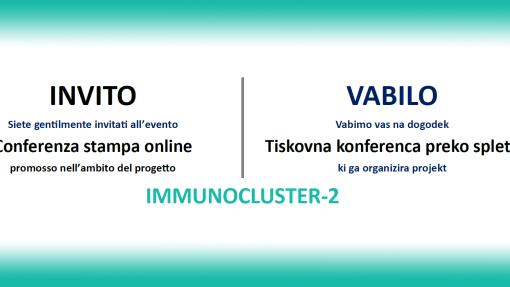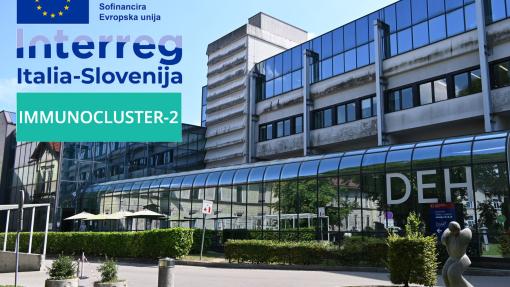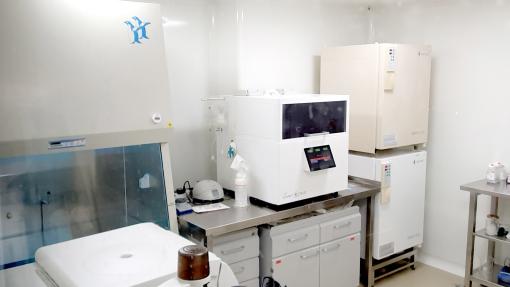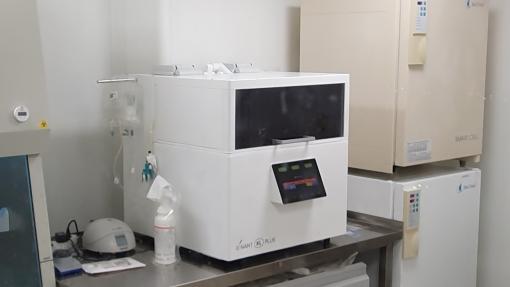
IMMUNOCLUSTER-2
Policy objective: PO1 - A more competitive and smarter Europe by promoting innovative and smart economic transformation and regional ICT connectivity
Specific objective: SO1 - Developing and enhancing research and innovation capacities and the uptake of advanced technologies
Typology: capitalization project
IIMMUNOCLUSTER-2 project addresses the strengthening of cross-border cooperation to improve the quality of life of the population.
- The overall objective of the project is to initiate a clinical trial for the treatment of triple-negative breast cancer (TNBC) using a cellular vaccine (aHyC) at an interregional level. The goal is to create opportunities for providing personalized advanced cancer therapies in regions on both sides of the border in a cost-effective manner, foster innovation capabilities, and enable the introduction of advanced technologies.
- Based on the current landscape, the project will promote innovation and enhance technology transfer to SMEs, strengthen collaboration between innovative companies, research institutions, and healthcare providers, and build on the achievements of the previous INTERREG ITA-SLO 2014–2020 Immuno-Cluster project, within a new integrated regional framework.
- The innovation of the IMMUNOCLUSTER-2 project is reflected on multiple levels, particularly in the integration of NANT technology (bioreactor by VivaBioCell, VBC) into the aHyC production process (established by Celica). This technology, validated in the previous Immuno-Cluster project, enables the scaling up of aHyC vaccine production and supports the launch of a clinical trial for TNBC treatment at the interregional level.
- The combination of these innovations and collaboration between Slovenian and Italian hospitals and research institutions will provide patients in the INTERREG ITA-SLO program area access to cutting-edge cancer treatments.
The project officially launched with a virtual kick-off meeting on 7 September 2023. During the meeting, all project partners were introduced to the project content, planned activities per work package, administrative obligations, and the timeline for achieving results. A steering committee was established, comprising representatives of all project partners (PP), to ensure effective communication within and between partners and the lead partner (LP). The first periodic meeting took place in person on 26 January 2024 at Celica’s premises in Ljubljana. A related interview was also published in the local media: https://sis-egiz.eu/2024/01/30/preboji-so-na-pragu/. As part of the aHyC immunohybrid preparation, partners ZTM, VBC, and Celica aligned the protocol for dendritic cell (nDC) production using the NANT-XL bioreactor and defined the specifications of the leukapheresis product for monocyte isolation. The aHyC preparation protocols were adapted for the TNBCindication, and a draft clinical trial protocol for treating TNBC with aHyC was prepared.
The second regular meeting was held on 7 August 2024 and focused on key project milestones. To support regulatory compliance and cross-border collaboration, a workshop was proposed with national regulatory agencies from Italy and Slovenia. In collaboration with ZTM, the quality standards and preparation of the leukapheresis product were harmonized. The implementation of the NANT technology in a good manufacturing practice (GMP)-compliant environment began in cooperation with VBC. ZTM optimized the apheresis procedure, including component separation, and conducted a collection from a healthy donor. Key biological parameters, such as platelet activation and the proportion of immunosuppressive monocytes (CD14+DR lo/neg), were measured. These may serve as quality indicators for future procedures.
By the end of this phase, documentation was prepared for submission to the Agency for Medicinal Products and Medical Devices of Slovenia (JAZMP) and the National Ethics Commission for clinical trial approval. In November 2024, a workshop was held in cooperation with JAZMP to address legal and ethical requirements for including patients in a cross-border clinical study.
The third periodic meeting was held remotely in February 2025. The status and further steps were discussed. The protocol for preparing aHyC for treating TNBC has been developed in an initial implementation phase and will be adjusted based on tumor cell characteristics. We have begun preparing immunohybridomas in accordance with GMP, so the production of immunohybridomas for patients can begin immediately upon regulatory approval. VBC installed the NANT-XLP bioreactor at Celica’s facilities, upgraded the software, and optimized the dendritic cell isolation protocol. Process alignment to increase production capacity is ongoing. ZTM provided five leukapheresis samples that were processed both manually and using the NANT-XLP bioreactor for validation purposes. Validation of the NANT-XLP bioreactor was completed through two additional validation cycles. The results confirmed that cell quality obtained through the bioreactor is comparable to the manually prepared cells. All leukapheresis products were prepared following the optimized ZTM protocol and passed the required biological tests for further processing. The next step involves a detailed evaluation of differentiation outcomes between the two methods. After review by JAZMP and the National Ethics Commission, some questions were raised that are currently being addressed in the revised protocol.
In Italy, PP5-ASUFC and PP4-UNIUD have already identified suitable hospitals and begun their involvement. The intermediate nDC product was prepared in a GMP environment in seven iterations with consistent quality results, providing the foundation for the final GMP production protocol. Additional preclinical studies are underway, and the resulting data will be included in the Investigational Medicinal Product Dossier (IMPD).
PP5-ASUFC and PP4-UNIUD submitted a draft clinical protocol to the Italian regional ethics committee. Italian patients are continuously informed about the possibility of enrolling in the study. ASUFC monitors an annual cohort of more than 50 TNBC patients. In the third period, LP1-Celica organized a stakeholder meeting at the JAZMP headquarters with participation from all project partners to define cross-border patient inclusion criteria. PP5-ASUFC, UNIUD, and VBC are jointly developing a proposal for a cross-regional patient recruitment platform. The platform will include all necessary information on requirements and obligations for both patients and hospitals.
The fourth periodic partner meeting was held virtually in July 2025. All partners were updated on project progress and agreed on the next steps. The project duration has been extended until the end of 2025. Selected project content was presented to the broader public in the national science television show Ugriznimo znanost on RTV SLO 1, in the episode titled "Human Cell" (aired on 8 May 2025): https://365.rtvslo.si//arhiv/ugriznimo-znanost/175130194.
In the fifth period of the project, we had the fifth periodic meeting with all partners on October 17, 2025, at which we finalized the timeline for the implementation of the remaining activities. We have submitted a renewed application for approval of the clinical study to JAZMP (Public Agency of the Republic of Slovenia for Medicinal Products and Medical Devices) and to the Commission of the Republic of Slovenia for Medical Ethics, and have already obtained an interim assessment and addressed all ambiguities. The clinical trial will begin with a phase 1 trial, in which we will enroll 10 patients with TNBC. After the completion of phase 1, we will analyze the data obtained during the trial and, if the safety profile of the therapy is favorable, we will continue with a phase 2 study, in which we will enroll an estimated 72 patients. We have also prepared a document with information about the clinical trial with consent for patients who meet the inclusion criteria and wish to participate in the study. Enrollment of TNBC patients in the clinical trial will begin immediately after notification that the clinical trial has been approved, expected in the first half of 2026. As part of the project, we published a Project Brochure, separately in three languages, which presents the objectives, main activities and achievements of the project. We also organized a final meeting of all project partners, which took place on December 5, 2025 at the Institute of Oncology in Ljubljana, at which the partners presented all the activities carried out and achievements during the project period. In December 2025, we also organized an online press conference, at which we presented the project and the project achievements to journalists and the general public.
